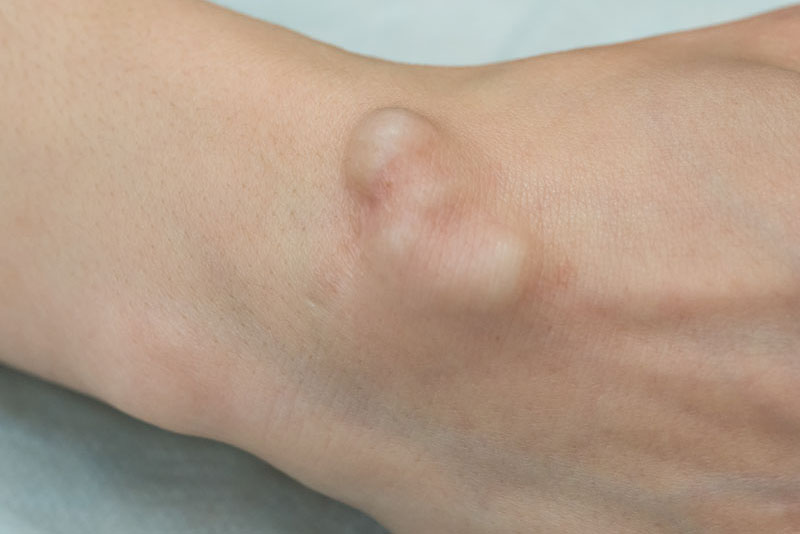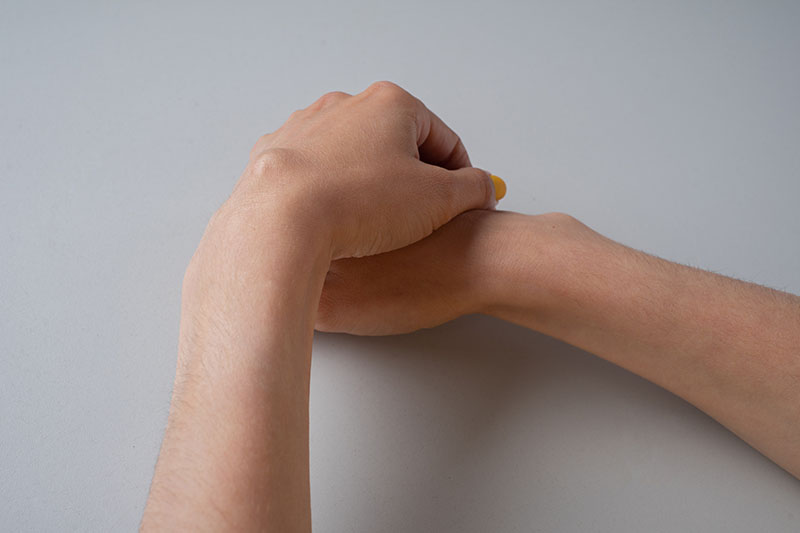What is a Cyst?
Cysts are abnormal sacs in the body that are filled with fluid or semisolid material. The look like small lumps, often red or off-white in colour. They can form on the skin, mucus membranes (i.e. the inner linings of some organs and cavities such as the nose, mouth or stomach), or inside organs. Cysts can have various causes and symptoms depending on their type and location. Some cysts are harmless and do not need treatment, while others may cause pain, infection, or complications. Our professional cysts Manchester clinic have put together some common questions and answers about cysts.

What causes cysts?
A cyst can be caused by different factors, such as:
- Genetic conditions that affect the development of cells or tissues
- Tumours that grow inside or near organs and create pressure
- Inflammatory conditions that trigger the immune system to produce fluid or pus
- Blockages of ducts or glands that prevent the normal flow of fluids
- Infections that cause swelling or abscesses
- Injuries that damage the skin or underlying tissues
How common are cysts?
Cysts are very common and can affect anyone at any age. Common locations include wrist, foot and ankle, arms and leg and the back.
Some types of cysts are more prevalent in certain groups of people, such as:
- Epidermoid cysts and sebaceous cysts, which form on the skin and are more common in adults than children
- Breast cysts, which form in the breast tissue and are more common in women than men
- Ganglion cysts, which form on the joints or tendons and are more common in women than men. These types of cysts have attracted the moniker “bible bump”.
- Bartholin’s cysts, which form in the vagina and are more common in women of reproductive age
- Meibomian cysts, which form on the eyelid and are more common in older adults
Is a cyst something to worry about?
Most cysts are benign or noncancerous and do not pose a serious threat to your health. However, some cysts may cause problems if they:
- Grow large and press on nearby organs or nerves
- Rupture and release their contents into the surrounding tissues
- Become infected and cause pain, fever, or pus
- Bleed internally and cause anaemia or shock
- Are cancerous or precancerous and spread to other parts of the body
Should cysts be removed?
Cysts do not always need to be removed if they are not causing any symptoms or complications. However, removal may be recommended if you have:
- An infected cyst that does not respond to antibiotics
- A large or painful cyst that interferes with your daily activities or quality of life
- A cosmetic concern about a visible cyst on your face or body
- A risk of developing cancer from a certain type of cyst
How are cysts removed?
Cysts can be removed by different methods depending on their type, size, location, and condition. Some of the common methods are:
- Aspiration, which involves using a needle or a catheter to drain the fluid from the cyst
- Injection, which involves injecting a steroid or other medication into the cyst to reduce its size or inflammation
- Surgery, which involves making an incision and cutting out the cyst along with some surrounding tissue
- Laser therapy, which involves using a high-intensity light beam to vaporize the cyst
Getting treatment for cysts from the Manchester Lumps Clinic
If you are wanting more advice about your Cyst or Cysts, Manchester Lumps Clinic can be booked by your GP for a referral, or you can book an appointment with us directly.
Diagnosing a cyst typically involves a combination of medical history, physical examination, and, in some cases, imaging studies.
Here’s an overview of the diagnostic process:
- Your doctor will ask about your symptoms, how long you’ve had them, and any relevant medical history.
- A clinical examination will be performed to assess the size, shape, and consistency of the lump or affected area.
- Depending on the suspected location of the cyst, we might recommend imaging studies such as ultrasound, or MRI to get a clearer view of the cyst and its surrounding tissues.
- In some cases, a biopsy may be performed to extract a sample of tissue from the cyst for further analysis. This can help determine if the cyst is benign (harmless) or malignant (cancerous).
- Once diagnosed, the appropriate treatment plan can be determined based on the type, size, and location of the cyst, and usually surgical excision is advised if it cannot be treated with aspiration and or steroid injection.
As mentioned above, cysts can often be harmless. But it’s important to seek professional advice to determine if a cyst is actually a cyst or something more serious.
Contact our Manchester clinic today for your Cyst Treatment Plan
If you have a cyst-like lump and you’d like a professional assessment, contact the Manchester Lumps Clinic for cysts Manchester advice and appointments.
Manchester Cyst advice and appointments
Speak to one of our friendly team today to either book your Cyst Manchester appointment or ask for friendly and helpful advice.
Useful links:

